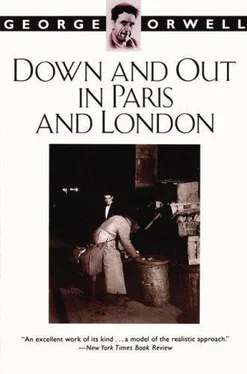George Orwell - Down and Out in Paris and London
Здесь есть возможность читать онлайн «George Orwell - Down and Out in Paris and London» весь текст электронной книги совершенно бесплатно (целиком полную версию без сокращений). В некоторых случаях можно слушать аудио, скачать через торрент в формате fb2 и присутствует краткое содержание. Жанр: Старинная литература, на русском языке. Описание произведения, (предисловие) а так же отзывы посетителей доступны на портале библиотеки ЛибКат.
- Название:Down and Out in Paris and London
- Автор:
- Жанр:
- Год:неизвестен
- ISBN:нет данных
- Рейтинг книги:5 / 5. Голосов: 1
-
Избранное:Добавить в избранное
- Отзывы:
-
Ваша оценка:
- 100
- 1
- 2
- 3
- 4
- 5
Down and Out in Paris and London: краткое содержание, описание и аннотация
Предлагаем к чтению аннотацию, описание, краткое содержание или предисловие (зависит от того, что написал сам автор книги «Down and Out in Paris and London»). Если вы не нашли необходимую информацию о книге — напишите в комментариях, мы постараемся отыскать её.
Down and Out in Paris and London — читать онлайн бесплатно полную книгу (весь текст) целиком
Ниже представлен текст книги, разбитый по страницам. Система сохранения места последней прочитанной страницы, позволяет с удобством читать онлайн бесплатно книгу «Down and Out in Paris and London», без необходимости каждый раз заново искать на чём Вы остановились. Поставьте закладку, и сможете в любой момент перейти на страницу, на которой закончили чтение.
Интервал:
Закладка:
a Communist when sober, he turned violently patriotic
when drunk. He started the evening with good
Communist principles, but after four or five litres he
was a rampant Chauvinist, denouncing spies,
challenging all foreigners to fight, and, if he was not
prevented, throwing bottles. It was at this stage that he
made his speech-for he made a patriotic speech every
Saturday night. The speech was always the same, word
for word. It ran:
"Citizens of the Republic, are there any Frenchmen
here? If there are any Frenchmen here, I rise to remind
them-to remind them in effect, of the glorious days of
the war. When one looks back upon that time of
comradeship and heroism-one looks back, in effect,
upon that time of comradeship and heroism. When one
remembers the heroes who are dead-one remembers, in
effect, the heroes who are dead. Citizens of the
Republic, I was wounded at Verdun
"
Here he partially undressed and showed the wound
he had received at Verdun. There were shouts of
applause. We thought nothing in the world could be
funnier than this speech of Furex's. He was a well-
known spectacle in the quarter; people used to come in
from other
bistros to watch him when his fit started.
The word was passed round to bait Furex. With a
wink to the others someone called for silence, and asked
him to sing the « Marseillaise. » He sang it well, in a fine
bass voice, with patriotic gurgling noises deep down in
his chest when he came to
« Aux arrmes, citoyens!
Forrmez vos bataillons!
» Veritable tears rolled down his
cheeks; he was too drunk to see that everyone was
laughing at him. Then, before he had finished, two
strong workmen seized him by either arm and held him
down, while Azaya shouted, "Vine l'Allemagne! » just out
of his reach. Furex's face went purple at such infamy.
Everyone in the bistro began shouting together, "
Vive
l'Allemagne! A bas la France!"
while Furex struggled to
get at them. But suddenly he spoiled the fun. His face
turned pale and doleful, his limbs went limp, and before
anyone could stop him he was sick on the table. Then Madame
F. hoisted him like a sack and carried him up to bed. In the
morning he reappeared quiet and civil, and bought a copy of
L'Humanité
.
The table was wiped with a cloth, Madame F.
brought more litre bottles and loaves of bread, and we
settled down to serious drinking. There were more
songs. An itinerant singer came in with his banjo and
performed for five-sou pieces. An Arab and a girl from
the
bistro down the street did a dance, the man wielding
a painted wooden phallus the size of a rolling-pin.
There were gaps in the noise now. People had begun to
talk about their love-affairs, and the war, and the barbel
fishing in the Seine, and the best way to
faire la
revolution
, and to tell stories. Charlie, grown sober again,
captured the conversation and talked about his soul for
five minutes. The doors and windows were opened to
cool the room. The street was emptying, and in the
distance one could hear the lonely milk train thundering
down the Boulevard St. Michel. The air blew cold on
our foreheads, and the coarse African wine still tasted
good: we were still happy, but meditatively, with the
shouting and hilarious mood finished.
By one o'clock we were not happy any longer. We
felt the joy of the evening wearing thin, and called
hastily for more bottles, but Madame F. was watering
the wine now, and it did not taste the same. Men grew
quarrelsome. The girls were violently kissed and hands
thrust into their bosoms and they made off lest worse
should happen. Big Louis, the bricklayer, was drunk,
and crawled about the floor barking and pretending to
be a dog. The others grew tired of him and kicked at
him as he went past. People seized each other by the
arm and began long rambling confessions, and were
angry when these were not listened to. The crowd
thinned. Manuel and another man, both gamblers, went
across to the Arab
bistro , where card-playing went on till
daylight. Charlie suddenly borrowed thirty francs from
Madame F. and disappeared, probably to a brothel. Men
began to empty their glasses, call briefly, «
'Sieurs, dames !"
and go off to bed.
By half-past one the last drop of pleasure had
evaporated, leaving nothing but headaches. We perceived
that we were not splendid inhabitants of a splendid
world, but a crew of underpaid workmen grown squalidly
and dismally drunk. We went on swallowing the wine,
but it was only from habit, and the stuff seemed suddenly
nauseating. One's head had swollen up like a balloon, the
floor rocked, one's tongue and lips were stained purple.
At last it was no use keeping it up any longer. Several
men went out into the yard behind the bistro and were
sick. We crawled up to bed, tumbled down half dressed,
and stayed there ten hours.
Most of my Saturday nights went in this way. On the
whole, the two hours when one was perfectly and wildly
happy seemed worth the subsequent headache. For
many men in the quarter, unmarried and with no future
to think of, the weekly drinking-bout was the one thing
that made life worth living.
XVIII
CHARLIE told us a good story one Saturday night in the
bistro
. Try and picture him-drunk, but sober enough to
talk consecutively. He bangs on the zinc bar and yells for
silence:
"Silence,
messieurs et dames -silence, I implore you!
Listen to this story, that I am about to tell you. A
memorable story, an instructive story, one of the
souvenirs of a refined and civilised life. Silence,
messieurs
et dames
!
"It happened at a time when I was hard up. You
know what that is like-how damnable, that a man of
refinement should ever be in such a condition. My
money had not come from home; I had pawned every-
thing, and there was nothing open to me except to
work, which is a thing I will not do. I was living with a
girl at the time-Yvonne her name was-a great half-witted
peasant girl like Azaya there, with yellow hair and fat
legs. The two of us had eaten nothing in three days.
Mon
Dieu
, what sufferings! The girl used to walk up and
down the room with her hands on her belly, howling
like a dog that she was dying of starvation. It was
terrible.
"But to a man of intelligence nothing is impossible. I
propounded to myself the question, 'What is the easiest
way to get money without working?' And immediately
the answer came: 'To get money easily one must be a
woman. Has not every woman something to sell?' And
then, as I lay reflecting upon the things I should do if I
were a woman, an idea came into my head. I
remembered the Government maternity hospitals-you
know the Government maternity hospitals? They are
places where women who are enceinte are given meals
free and no questions are asked. It is done to encourage
childbearing. Any woman can go there and demand a
meal, and she is given it immediately.
«
'Mon Dieu !' I thought, 'if only I were a woman! I
would eat at one of those places every day. Who can
tell whether a woman is enceinte or not, without an
Читать дальшеИнтервал:
Закладка:
Похожие книги на «Down and Out in Paris and London»
Представляем Вашему вниманию похожие книги на «Down and Out in Paris and London» списком для выбора. Мы отобрали схожую по названию и смыслу литературу в надежде предоставить читателям больше вариантов отыскать новые, интересные, ещё непрочитанные произведения.
Обсуждение, отзывы о книге «Down and Out in Paris and London» и просто собственные мнения читателей. Оставьте ваши комментарии, напишите, что Вы думаете о произведении, его смысле или главных героях. Укажите что конкретно понравилось, а что нет, и почему Вы так считаете.












